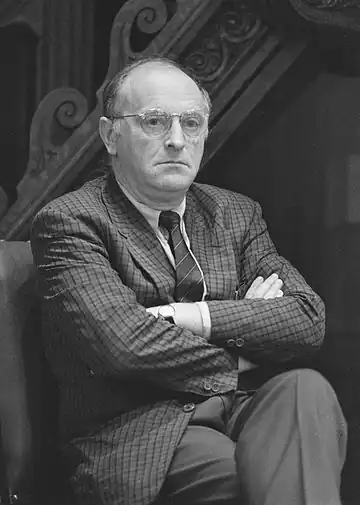1987 Nobel Prize in Literature
The 1987 Nobel Prize in Literature was awarded to the Russian–American poet and essayist Joseph Brodsky (1940–1996) "for an all-embracing authorship, imbued with clarity of thought and poetic intensity."[1][2][3]
| Joseph Brodsky | |
 "for an all-embracing authorship, imbued with clarity of thought and poetic intensity." | |
| Date |
|
| Location | Stockholm, Sweden |
| Presented by | Swedish Academy |
| First awarded | 1901 |
| Website | Official website |
Laureate
At the age of 18, Joseph Brodsky started writing poetry. His poetry was influenced by British poets like John Donne and W. H. Auden as well as Russian predecessors like Alexander Pushkin and Boris Pasternak. Brodsky's forced exile affected his writing, both thematically and linguistically. He details how he gradually loses hair, teeth, consonants, and verbs in Chast' rechi ("A Part of Speech", 1977). The interaction between the poet and society appears frequently in his poems. According to Brodsky, literature and language are vital tools for the advancement of society and the advancement of human thought. His famous literary and autobiographical essay collection Less Than One: Selected Essays (1986) explores his fellow Russian writers like Dostoyevsky, Mandelstam, and Platonov.[4][5]
References
- The Nobel Prize in Literature 1987 nobelprize.org
- Howell Raines (23 October 1987). "Exiled Soviet Poet Wins Nobel Prize in Literature". The New York Times. Retrieved 21 May 2021.
- Seamus Heaney (8 November 1987). "Brodsky's Nobel: What the Applause Was About". The New York Times. Retrieved 21 May 2021.
- Joseph Brodsky britannica.com
- Joseph Brodsky – Facts nobelprize.org
External links
- 1987 Press release nobelprize.org
- Award ceremony speech nobelprize.org